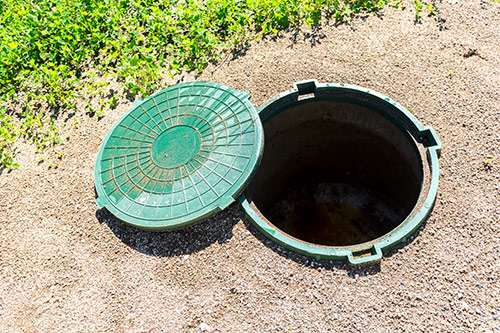
First you need to know how a septic system works. A septic system treats all wastewater that comes from your home—from the dishwasher to the toilet—on site. Waste flows out of your home through a main line and into a water-tight septic tank through an inlet pipe.
Once inside the tank, the waste separates into several layers. And just a heads up, the layers do not have lovely names. Solids known as sludge—we warned you—fall to the bottom of the tank while grease and oil, known as scum, form a layer that floats on the top.
The remaining water in the middle—called effluent—passes the test to move on to the next treatment area through an outlet pipe and into a drain field. A drain field, or "leach field," includes unsaturated soil, pipes, and chambers that treat the water further. Oxygen, microbes, and bacteria in the soil remove the final harmful materials in the effluent before it heads back into the earth.
As you can imagine, building and maintaining such a complex system in your backyard can be complicated. When well-cared for, however, septic systems can be both cost-effective and highly beneficial for rural areas.
Pros
- Ideal for rural areas without access to city sewer systems
- No monthly costs outside of maintenance
- Naturally treats water
- If there are leaks, contamination is concentrated to one area
- Easier to install compared to new city line hookup
Cons
- Requires pumping every three to five years
- Replacement is more expensive than sewer
- Solid materials are more likely to clog and back up systems
- Leaks can lead to potent and unhealthy waste in your backyard
- Roots can damage septic system pipes
For more information on septic system installation, contact Morse Engineering and Construction.
Source: angi.com
